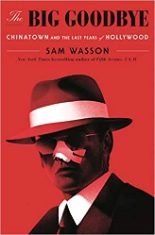
 Right on the jacket, Flatiron Books makes a so-bold-it’s-ballsy claim about Sam Wasson’s The Big Goodbye: Chinatown and the Last Years of Hollywood: that it “will take its place alongside classics like Easy Riders, Raging Bulls and The Devil’s Candy as one of the great movie-world books ever written.”
Right on the jacket, Flatiron Books makes a so-bold-it’s-ballsy claim about Sam Wasson’s The Big Goodbye: Chinatown and the Last Years of Hollywood: that it “will take its place alongside classics like Easy Riders, Raging Bulls and The Devil’s Candy as one of the great movie-world books ever written.”
I can’t go that far. But I will call The Big Goodbye one of the best-written movie-world books (and yes, there is a difference). Consider this bit on Jack Nicholson, which reads like the very thing it describes: “Amazed by his staggering ability to draw out the shortest line of dialogue, to make a meal of crumbs, he realized that Nicholson’s innate mastery of suspense, of making the audience wait and wait for him reach the end of a line, added drama to the most commonplace speech, and Nicholson’s monotone, rather than bore the listener, inflected the mundane with an ironic tilt.”
That’s poetry! And yet, to be honest, I found more delight in Wasson’s 2010 bestseller, Fifth Avenue, 5 A.M.: Audrey Hepburn, Breakfast at Tiffany’s, and the Dawn of the Modern Woman, even though I have no strong affection for the Blake Edwards romantic comedy at its chewy center.
But let’s leave “Moon River” for an L.A. reservoir. Instead of a linear chronicle of the making of Paramount Pictures’ 1974 classic, Chinatown, the author uses The Big Goodbye to tell the making of four key creatives — Nicholson, director Roman Polanski, writer Robert Towne and studio exec Robert Evans — and how their individual histories informed the shared one they would create.
Polanski is first up; unfortunately, his story is the one least in need of retelling — especially this year, in the wake of the Manson murders’ 50th anniversary, the release of Quentin Tarantino’s Once Upon a Time … in Hollywood and the ongoing furor over his crimes of sexual abuse, both alleged and proven.
Nicholson’s story is one of temper and talent, indelibly linked. Evans’, one of legendary largesse, which puts the jacket flap’s boast right in line with his wavelength of exaggerated arrogance: “You know I’ve gotten more women pregnant than anyone in history. You know how? Love Story!”
Naturally, the tale that’s most interesting among these highly, highly flawed men is the one least known to the public: the lower-than-low-profile Towne. Wasson paints a full portrait of the enigmatic man and the screenplay’s long gestation period, abandoned plot points and characters and all. The most revelatory aspect of The Big Goodbye is the issue of Chinatown’s authorship, with Towne relying heavily on longtime friend Edward Taylor on building the noir-soaked narrative of the SoCal water wars — a backdrop Polanski more or less turned into a MacGuffin. Read The Big Goodbye for this story, if no other.
Oh, and in case you’re wondering, although she’s not one of the four focal points, Faye Dunaway does play a part … and doesn’t emerge as a saint, either. Then again, she never does. —Rod Lott
